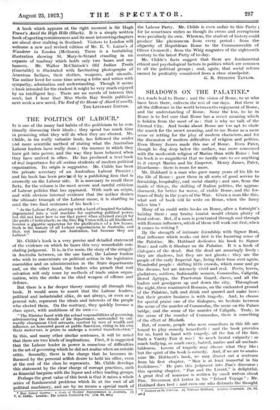. THE POLITICS OF LABOUR.*
IT is one of the many bad habits of the politicians to be con- tinually discussing their ideals ; they spend too much time in promising what they will do when they are elected. Mr. Childe, in his really valuable book, has followed the colder and more scientific method of stating what the Australian Labour leaders have really done; the manner in which they have got into power, and the way they have behaved when they have arrived in office. He has produced a text-book of real importance for all serious students of modern political organization. Its origin is suggestive. Mr. Childe has been the private secretary of an Australian Labour Premier ; and his book has been proCue xl by a publishing firm that is avowedly on the Labour side. It is necessary to recall these facts, for the volume is the most severe and careful criticism of 'Labour- politics that has appeared. With such an origin, and with obvious internal evidence that the author desires the ultimate triumph of the Labour cause, it is startling to read the two final sentences of his book :— " As the Labour Party, starting with a band of inspired Socialists, degenerated into a vast machine for capturing political power, but did not know how to use that power when attained except for the profit of individuals; so the One Big Union will, in all likelihood, become a gigantic apparatus for the glorificaticn of a few bosses. Such is the history of all Labour organisations in Australia, and that, not because they are Australian, but because they are Labour."
Mr. Childe's book is a very precise and detailed statement of the evidence on which he bases this very remarkable con- cluding judgment. It is, in the main, the story of the struggle in Australia between, on the one hand, the Labour leaders who wish to concentrate on political action in the legislative assemblies and on administration in the State departments and, on the other hand, the leaders who preach that real salvation will only come by methods of trade union organ- ization, with the strike as the chief weapon of offence and defence.
But there is a far deeper theory running all through this book. It would seem to assert that the Labour leaders, political and industrialist alike, do not always, or even as a general rule, represent the ideals and interests of the people who elected them. On the contrary, they quickly become a class apart, with ambitions of its own :—
"The Minister faced with the actual responsibilities of governing, administering the details of his department, surrounded by out- wardly obsequious Civil servants, courted by men of wealth and influence, an honoured guest at public functions, riding in his own State motor-car, is prone to undergo a mental transformation."
In this, and many other similar sentences, it will be noted that there are two kinds of implications. First, it is suggested that the Labour leader in power is conscious of difficulties in the art of governing which he did not realize when an outside critic. Secondly, there is the charge that he becomes in- fluenced by the personal selfish desire to hold his office, even at the cost of the class he represents. Mr. Childe develops this statement by the clear charge of corrupt practices, such as financial bargains with the liquor and other trading groups.
Perhaps the great value of this book is that it raises a whole series of fundamental problems which lie at the root of all political machinery, and are by no means a special mark of
• How Labour Governs : a Stodp of Workers' Representation in Australia. ny • Shadows on the Pala:ins. By WIlfranc Hubbard. London: Conetable. pa. 64.
Y. G. Childe, London; The Labour Publishing Co. (12a, 64, net.) - net.] •
the Labour Party. Mr. Childe is even unfair to this Party ; for he-sometimes writes as though its errors and corruptions were peculiarly its own. Whereas, the student of history could produce like phenomena from every period : from the- oligarchy of Republican Rome to the Commonwealth of Oliver Cromwell ; from the Whig magnates of the eighteenth century to the latest Party of to-day.
Mr. Childe's facts suggest that there are fundamental ethical and psychological factors in politics which are common to all the political groups ; and, again, that social reform cannot be profitably considered from a class standpoint. .
G. R. STIRLING TAYLOR.


































 Previous page
Previous page